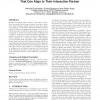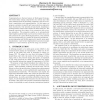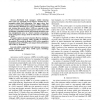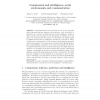557 search results - page 46 / 112 » Using Intelligent Agents to understand organisational behavi... |
111
click to vote
ATAL
2010
Springer
15 years 1 months ago
2010
Springer
Speakers in dialogue tend to adapt to each other by starting to use similar lexical items, syntactic structures, or gestures. This behaviour, called alignment, may serve important...
90
Voted
ATAL
2003
Springer
15 years 5 months ago
2003
Springer
Communication is the key feature of Multi-agent Systems. The interactions among components of a system may take many distinct forms of increasing complexity such as in auctions, n...
104
Voted
AUSAI
1997
Springer
15 years 4 months ago
1997
Springer
Co-ordination is the glue that binds the activities of autonomous problem-solving agents together into a functional whole. Co-ordination mechanisms for distributed problem-solving ...
117
Voted
IAT
2010
IEEE
14 years 10 months ago
2010
IEEE
Distributed load managers exhibit thrashing where tasks are repeatedly moved between locations due to incomplete global load information. This paper shows that systems of Autonomou...
86
Voted
AGI
2011
14 years 4 months ago
2011
Compression has been advocated as one of the principles which pervades inductive inference and prediction - and, from there, it has also been recurrent in definitions and tests of...




